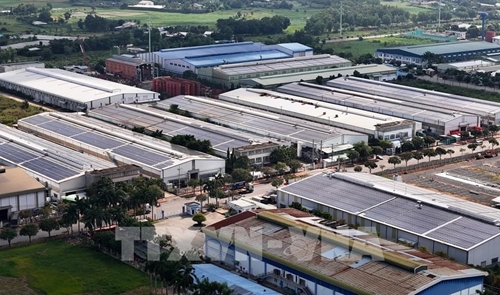The events were co-hosted by Informa Markets Vietnam, the Asia-Pacific Urban Energy Association (APUEA), the Vietnam Internet Association, and other units.
Experts noted that Vietnam is becoming a regional leader in infrastructure investment, with an investment level reaching 6% of GDP, significantly higher than the ASEAN average of 2.3%.
    |
 |
|
Ho Chi Minh City firms use solar power panels. |
Lu Minh Quyen, Senior Project Manager at Informa Markets Vietnam, highlighted a critical need for investment, citing the Global Infrastructure Facility data as saying that Vietnam requires USD 25 billion annually to meet its infrastructure needs. However, the national budget can only cover around USD 15 billion, presenting both challenges and opportunities for both private and public sectors in investment promotion and strategic project development.
The nation's shift toward renewable energy is evident in the Power Development Plan VIII, which was approved last year. By 2030, renewable sources are expected to make up 27% of Vietnam’s electricity mix, with onshore wind power contributing 14.5%, offshore wind power 4%, and solar power 8.5%.
APUEA Executive Director Peter Lundberg said Vietnam, like many other regional countries, faces the dual challenge of meeting growing energy demand while addressing the urgent need to reduce carbon emissions.
To address these challenges, Vietnam has set ambitious climate goals, including achieving net-zero greenhouse gas emissions by 2050. This requires significant effort but presents substantial opportunities for renewable energy development.
A successful energy transition must go beyond simply adopting renewable energy sources. Smarter energy use, increased efficiency, and innovative technologies that reduce energy costs and lower dependence on fossil fuels will be key to realizing a sustainable energy future, he said.
Source: VNA